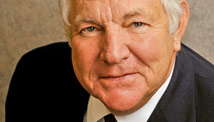GOP's not heading toward isolationism

- William Bennett: GOP is not turning in an isolationist direction
- He says presidential candidates are raising legitimate questions about Obama policies
- He says terrorism threat requires continued support for military action
Editor's note: William J. Bennett is the Washington fellow of the Claremont Institute. He was U.S. secretary of education from 1985 to 1988 and was director of the Office of National Drug Control Policy under President George H.W. Bush.
(CNN) -- Ever since the CNN Republican presidential debate last week, a great deal of analysis has poured out, from elected officials and analysts, suggesting the GOP is becoming an isolationist party. Two thoughts: 1) If that were the case, that would be wrong and wrongheaded; and 2) It is not the case.
The debate last week was very short on foreign policy questions. There were only three direct questions, and not all of the candidates were given the opportunity to answer each of those three. Nevertheless, the debate over a nascent isolationism has sprouted up, primarily over comments Mitt Romney made on Afghanistan and Michele Bachmann made on Libya.
Gergen: Obama should have listened to Petraeus
When asked "Isn't it time to bring our combat troops home from Afghanistan?" Romney said:
"It's time for us to bring our troops home as soon as we possibly can, consistent with the word that comes to our generals that we can hand the country over to the Taliban military in a way that they're able to defend themselves. Excuse me, the Afghan military to defend themselves from the Taliban. That's an important distinction.
" ... I think we've learned some important lessons in our experience in Afghanistan. I want those troops to come home based upon not politics, not based upon economics, but instead based upon the conditions on the ground determined by the generals.
"But I also think we've learned that our troops shouldn't go off and try and fight a war of independence for another nation. Only the Afghanis can win Afghanistan's independence from the Taliban."
Who doesn't want troops home as soon as possible? The question that should have been examined is what "conditions on the ground" make that decision possible. Fighting another nation's "war of independence" is more pregnant with implications. The natural follow-up to that would have been, "For example?" Is helping to liberate a country like Iraq or Afghanistan fighting another country's war of independence? It is not -- or at least it should not be considered as such.
There was very little dissent in the debate over the decision to liberate Afghanistan in 2001, the country in which al Qaeda was based. It is clear enough to me that after ousting the Taliban and al Qaeda, while there may have been mission creep, it was all in the service of not having al Qaeda or the Taliban return to power -- and that is still a worthy goal.
What I take Romney to mean is that we may have spent too much effort on attempting to build a civil society and not enough on trying to kill the enemy and safeguard civilian areas in Afghanistan. If that is indeed what he meant, that is no return to isolationism.
A lot of rethinking has taken place about Afghanistan, and today the mission there is much more controversial, with only 43% of Americans thinking it has been worth fighting. But a majority of Republicans do think Afghanistan has been worth the fighting. The withdrawal crowd is not the Republican crowd.
That said, there has been some politicking over war powers that enters this equation, as more and more Republican officeholders are now criticizing President Obama for ignoring or violating the War Powers Act in our campaign in Libya.
One can criticize Obama, legitimately I believe, for the way he committed us to Libya and the subordinating of the campaign to the U.N. and the Arab League's goals, saying, as he did: "If we tried to overthrow Gadhafi by force, our coalition would splinter."
But to take on the president over the War Powers Act is not in the Republican Party's long-term interests, with Republican officeholders in the past having typically viewed the act as unconstitutional in the first place.
There is enough wrong with the Libya campaign right now, and there is enough concern and confusion over the goals of the Afghanistan campaign as well, to cause the doubts they have. This is not, however, a sign of a resurgent isolationism. It is a sign of confusion -- added to by the incongruous policies we have adopted for Syria and Egypt (leave Syria alone, seek Mubarak's ouster, bomb Libya).
If we could have a coherent policy, based first on national security interests with clearly articulated goals, I suspect not only would the support in the polls for our military campaigns increase, so too would the supportive statements from the Republican candidates for president.
In the meantime, if it is the candidates' desire to show another way on foreign and defense policy, it is up to them to articulate what they think the president has wrong. We are in a global war right now and the world is still a very dangerous place. They should be asked about these issues more frequently.
The opinions expressed in this commentary are solely those of William J. Bennett.
